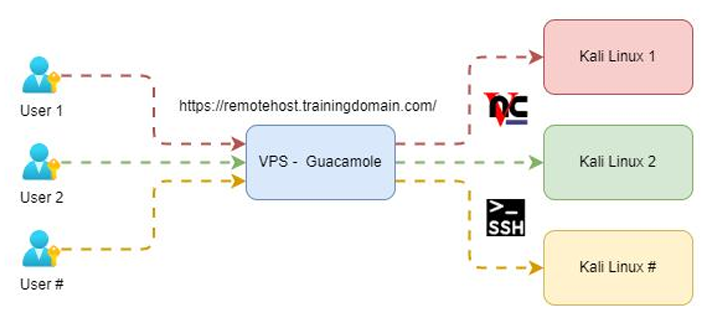
In today’s increasingly remote work environment, seamlessly accessing desktops and applications from anywhere has become essential. Apache Guacamole emerges as a powerful solution, offering secure and centralized remote access management. This article explores Guacamole, its key features, and how it empowers various sectors to thrive in a remote work landscape.
What is Apache Guacamole?
Apache Guacamole is a great piece of software that allows you to control desktops or servers on your device through a single website or gateway.
The user doesn’t need to install plugins or client software and leverages HTML5 technology to provide a web-based interface. This means users can access their desktops and applications from any device with a web browser, eliminating the need for additional software or specific operating systems.
It is an open-source remote desktop gateway which supports remote desktop protocols like RDP, VNC, and SSH, which means all you need is a device with a web browser.
Let’s find out the key features of Apache guacamole.
Key Features of Apache Guacamole
1. Clientless Access: Users do not need to install any software or plugins. They can access remote desktops and applications directly from any web browser.
2. Multi-Protocol Support: Guacamole supports RDP, VNC, SSH, and other protocols, allowing it to connect to a wide variety of systems and devices.
3. Centralized Management: The server centrally manages all configurations. Administrators can easily manage users, connections, and access controls from a single interface.
4. Security: Guacamole uses encrypted connections to ensure the security of data transmission between the client and the server.
We have identified the features of guacamole. Let’s see how Apache guacamole helps in different scenarios.
Use Case Scenarios of Apache Guacamole

The educational and health sectors are the two prime examples where Apache guacamole can be particularly beneficial.
In the educational sector:
- Remote Labs: Guacamole can facilitate remote access to lab environments. This allows students to access specialized software or hardware that may not be available on their personal devices or at their local institutions. This can be particularly useful for subjects like science, engineering, and design, where software access is crucial.
- Virtual Desktops: Educational institutions can leverage Guacamole to provide students with virtual desktops. These desktops can be pre-configured with specific software and settings, ensuring a consistent learning environment regardless of the student’s device.
- Online Assessments: Guacamole can be used to provide a secure testing environment for online assessments. By isolating the testing environment on a remote server, institutions can help mitigate the risk of cheating or unauthorized access.
In the health sector:
- Remote Patient Care: Guacamole can enable secure remote access to patient data and electronic health records (EHR) from any location with an internet connection. This can be beneficial for specialists who need to access patient information remotely or for telemedicine consultations.
- Diagnostic Tools: Guacamole can facilitate remote access to diagnostic tools and medical imaging software. This can allow radiologists or other specialists to analyze images remotely, improving efficiency and access to care in geographically dispersed areas.
- Administrative Access: Healthcare providers can use Guacamole to provide secure remote access to administrative desktops for staff working from home or off-site locations. This can improve productivity and streamline workflows.
Let us find out some other use case scenarios where Apache Guacamole works:
- Manufacturing and Industrial Automation: Guacamole can be used to monitor and control industrial equipment or access HMI (Human-Machine Interface) systems remotely.
- Small and Medium Businesses (SMBs): SMBs can leverage Guacamole’s cost-effectiveness and ease of use to provide secure remote access to employees working from home or on the go.
- IT and System Administration: Guacamole is a valuable tool for IT admins to remotely manage servers, troubleshoot issues, and perform maintenance tasks.
- Software Development: Developers can securely access shared development environments, allowing for collaborative coding and debugging without configuring local machines.
- Business Continuity and Disaster Recovery: During a natural disaster, power outage, or other disruptions, employees can access critical systems and data remotely through Guacamole, ensuring business continuity. IT teams can use Guacamole to simulate remote access scenarios during disaster recovery drills, ensuring that all systems are accessible in case of an actual disaster.
At Ucartz, we are happy to offer comprehensive support for Apache Guacamole. Our team of experienced professionals can assist you. We offer support through support tickets and live chats.
Conclusion
Apache Guacamole offers a powerful and flexible solution for remote access needs across various sectors. Its clientless nature, multi-protocol support, and centralized management make it an attractive choice for organizations looking to provide remote access to their systems. The Guacamole server allows you to configure connections for various remote machines, including both Linux and Windows systems. These connections can be configured to use different protocols, like RDP for Windows or SSH for Linux.
Ashily Shaji
Ashily, a dedicated content writer at Ucartz, consistently applies her best efforts to her writing. Beyond her writing pursuits, she has a passion for travelling.
